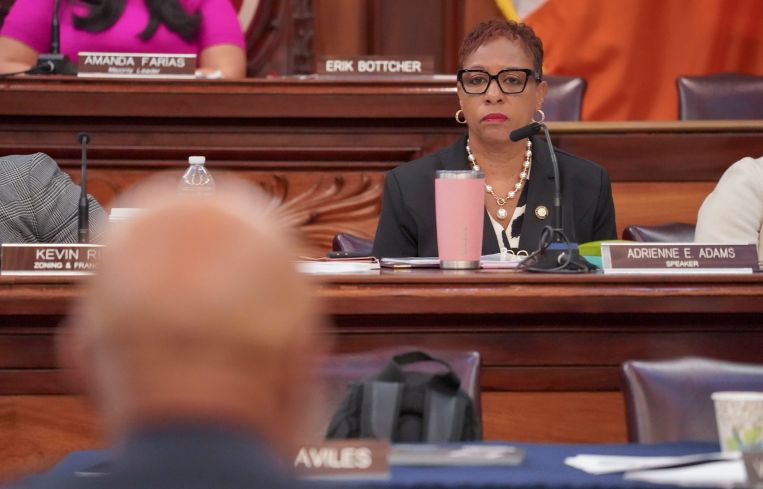New York City Council Counters City of Yes With ‘City For All’
The council’s plan calls for more funding for mass transit, repairs to Section 9 housing and adds more funds for first-time homebuyers
By Mark Hallum November 1, 2024 12:46 pm
reprints
New York City Council has a counter-proposal to Mayor Eric Adams’s ambitious plan to modernize the city’s outdated zoning code to spur more housing construction.
City Council Speaker Adrienne Adams released the “City For All” plan — a counter to Mayor Adams’s City of Yes for Housing Opportunity — on Friday morning stating that a simple rezoning will not guarantee affordability across the five boroughs. To address that, the Council’s plan increases funding for the Housing Preservation and Development, boosts voucher programs and puts more funding in the city’s public transportation system.
The council plan calls to double what is provided to prospective homebuyers through the HPD’s HomeFirst Down Payment Assistance Program as well add more funds to the HPD’s HomeFix program, which provides assistance to homeowners making repairs.
“Zoning reform alone cannot meet the full needs of our residents,” City Councilmember Diana Ayala said in a statement. “New Yorkers need a comprehensive set of investments and policies to deliver the housing security we deserve. The City For All housing plan presents holistic solutions that will create a more affordable, livable, and sustainable city, with a focus on deepening affordability, bolstering tenant protections, improving access to housing vouchers, investing in community infrastructure, and more.”
The plan also calls for better funding of mass transit and Department of Environmental Protection infrastructure to support an influx of housing and residents while requiring a deeper range of affordability in transit-oriented developments.
The City For All plan will expand funding for repairs for Section 9 units under the New York City Housing Authority’s purview and do the same to preserve Mitchell-Lama housing stock.
“New Yorkers need more housing, but affordability, homeownership opportunities, housing security and stability, and neighborhood investments are equally important to help working- and middle-class residents in our city,” Adrienne Adams said in a statement. “In order to ensure everyone in our city has safe and stable housing to continue contributing to the strength of our city and its economy, we must go beyond zoning reforms to address all the unrelenting housing pressures that leave New Yorkers struggling to afford finding or staying in homes.”
It also followed two days of hearings on the City of Yes in the city council chamber in which members of the Subcommittee on Zoning and Franchises grilled DCP Commissioner Dan Garodnick on the plan and heard testimony from members of the public.
Adams’s City of Yes proposal aims to allow the construction of about 109,000 more homes around the city in the next 15 years by lifting outdated zoning around the city. That includes greenlighting more office-to-residential conversions, eliminating parking mandates for new buildings in high-density zoning districts, allowing two- to five-story residential developments in some neighborhoods near mass transit stops and approving the use of accessory dwelling units in more suburban neighborhoods.
While the plan remained popular among trade organizations, council members questioned whether simply saturating the market would make housing more affordable or if it could go off without a hitch — overwhelming public infrastructure, that is.
”We look forward to continuing our already productive conversation with the City Council to address the housing crisis,” a spokesperson for the mayor said in a statement. “As discussions advance, we are encouraged to see that we continue to share many of the same policy goals and that the City Council recognizes this generational opportunity to move the needle on the city’s long-standing housing shortage. Together, we must build the housing New Yorkers need and deserve in every neighborhood.”
And the dueling zoning proposals aren’t the only ways the city is looking to boost housing construction.
This week, the New York Department of City Planning’s (DCP) push on Thursday to flood Midtown South with 9,700 new housing units through the “Midtown South Mixed-Use Plan,” which had originally only tried to facilitate 4,000 apartments.
Mark Hallum can be reached at mhallu@commercialobserver.com.



